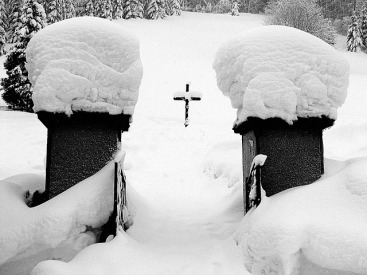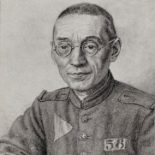The Brandsma Review
Pro Vita, pro Ecclesia Dei et pro Hibernia – A journal of conservative Catholic opinion from Ireland
Issue 133, July-August 2014
LETTER FROM BREZHNEV’S CATACOMBS
A CATHOLIC SCHOOLGIRL’S LIFE IN SOVIET LITHUANIA
By LAIMA BOTYRIENĖ
Plures efficimur, quoties metumur a vobis; semen est sanguis christianorum.—Tertullian, Apologeticus
I WAS BORN INTO A FAMILY of devout Roman Catholics. My father was a freedom fighter and acarpenter; my golden-hearted mother stayed at home, took care of us and wrote poetry. Both parents have each spent 15 years in Siberia prior to coming back to Lithuania and getting married. During their time in Russia’s Gulags, they experienced unimaginable violence and tortures whilst forced to live in inhumane conditions. Yet they have managed to preserve their bright minds and return home strong and unbroken. From the very young age I was told this was due to their faith in Jesus. This faith was very true in our family and naturally adopted by me and my brother.
My childhood was filled with stories and adventures. Granted, these were some terrible stories but when carefully filtered and skilfully told by my father, they inspired great respect and pride. My dad was my hero.
Apart from having the will of steel and being sharp-minded, he was very hardworking, talented in many areas and he had a brilliant sense of humour. He used to take us–my brother and I–to trips across Lithuania and since he knew all forests and countryside like the back of his hand (from his resistance days), these truly were what we call “quality times”. What I did not know at the time was that my father was actually distributing The Chronicle of Church and the Catholic Catechism this way. If he was caught–he would have probably been put back to prison or straight to death by some arranged accident.
Atheists by default
By law, the Soviet Union allowed the freedom of religion and speech but emphasised that all “normal, down-to-earth” citizens would be atheists by default. Those of a different opinion were publicly laughed at and privately punished. People who went to church were persecuted, added to local and national blacklists, separated from society by all means possible. Catholics were not allowed to hold any managerial positions, to become teachers or participate in any decision-making activities (then again there was no such thing as a clear referendum, as in Crimea recently, for example). If anyone was persistent or actively resisted the regime, accidents were staged; people were framed into committing a crime of some sort or in some cases, they were bluntly put to death by anonymous criminal who later “turned out to be another Catholic”.
This brings me to my school memories. Highly influenced by my parents’ lives, I was the only one who refused to become a “Septemberist”, then later a “Pioneer” and member of Komsomol, even though it was obligatory to do so. To punish me for not following the herd and what was now considered “active resistance”, they decided to place me in the worst class in school–Class F. This class was meant for students who were not very bright and in most cases just violent and unmanageable. Grades were expected to be the lowest in school– the average was not to exceed 2.5 in a 5 point system. Yet I developed a rebellious character and very soon teachers struggled to find reasons to award me lower marks, although they had been asked to do so. This only resulted in me learning all subjects inside-out and even though in Class F, I was effectively the best student in school.
My headmistress was the leader of communist teachers’ party in the area and I was causing some real problems for her. The school’s committee decided it was time to turn to alternative methods to convert me. My classmates were paid to attack me on the way home and bully me when at school. My headmistress was actually hiding in the bush making sure I was beaten as per prescription and my classmates then felt they had no choice or they would “end up like me”.
Nevertheless, since I helped quite a few of them with their homework, I started to receive anonymous notes advising to take another route home or kids who managed to stay neutral from the whole bullying business so far offering to walk me home.
Mocking the Church
Every month an atheistic event had to be held at school. These came in forms of student speeches, theatre or chorus performances, and even sporting events. One time, there was a theatre performance taking place mocking the Catholic Church and especially kids that chose to attend it. I was given a rosary, an old prayer book and dressed in old lady’s clothes with a black scarf on my head. They asked me to kneel in the centre of the stage and pray–this was supposed to be funny. I prayed with all my heart… for them.
I do not know who reported this to the Vatican but a short while after this particular event I heard my name on the radio and that my story was now recorded in Chronicles of Vatican. Surprisingly, my headmistress found out as well (was she listening to Radio Maria?) At this point her career depended on me and, desperate, she started beating me herself whenever the opportunity presented itself. Like calling me out of the class and banging my head against the wall in the corridor every second day. I can only imagine how my mother felt having to witness my academic progress on the back of my head.
My parents did what they could–my mother was a regular visitor to the principal’s office and she really stood up for me. This did not help but still gave me strength to endure the first eight years of schooling (after which I went to study to conservatoire of music where no headmistress ambitions of a similar scale existed).
As for the Holy Sacraments, newborns were baptised in secret, priests risking their heads in recipients’ homes. My preparation for First Holy Communion was quite an adventure as well. As we had to do it in secret, we would gather to “celebrate birthdays”–and this was mostly arranged on actual birthdays so as not to cause any suspicion to law abiding neighbours. We would dress up, someone would bake a pie and then we would study for the entire day. With proper 5-10min breaks, as in school. On other occasions, someone’s brave parents would organise class gatherings or bootcamps. If all is well, we would stay at one place for 2-3 days.
Worth the risk
We learned how to perform a Confession using a chair instead of a confession box, we had to be very careful about what we say and be rather quiet in case someone was listening at the door. Horrible things happened to people who were caught. Obviously, for this reason we could not go and take pictures after we had our Sacraments. This would draw too much unwanted attention (and everyone had a legal right to come up to you in the street and ask what you’d been up to!). For me, as a kid, it was all worth the risk. This made the Holy Communion even more special and precious to me.
Soon after my Confirmation (I was 9 years old) my father took me to join the Church Choir. Every Sunday (and every day of May–as this is a month dedicated to Holy Mother of God and rosary must be said every evening) my father would take me to church and we would sing our hearts out to Jesus. I have met my first teacher–organist Sister Benjamina–this way. She noticed I had talent and offered me training. Few years later, this worked as a cover for my attendance of Holy Mass in the legendary “fearless division” of Petrasiunai Parish and saved me from arrest. (I say fearless division because kids in this parish did not care about what would happen to them if their activity was discovered–they were beaten and tortured but accepted it all in the name of Jesus and continued on with their Catholic lives the very next day–I was incredibly lucky to have not experienced the actual torture and arrest).
I continued on with the same attitude to the Conservatoire of Music–where despite threats and active attempts to fail me in final exams I graduated with distinction.
Talking about graduation, one of the mandatory national exams was Marxism–Leninism. Students had to prepare a five-minute speech on a given topic from this subject. I spent the entire preparation time praying, knowing I would fail this one as my opinion would be incredibly controversial. As soon as I picked out my ticket and read the topic, I felt my blood burst into cheeks and took a deep breath to start my fight with the expert commission. At this very moment, the interviewing teacher handed me back my exam papers with the highest mark on top and advised everyone that I know the subject all-too-well to waste anyone’s time–“we might as well go to lunch early as this one is top of the class”. She knew me well and either did not want to be burnt at the stake for doing a lousy job in the classroom or… she did me a favour. Thank you, Jesus.
Music Academy (aka University) was much better. Times were changing. I became a choir conductor–Music teacher and I am now doing this job for 26 years. I am currently a founder and director of Schola Cantorum Kaunensis–school of Gregorian Chant. We sing at the Tridentine Mass every Sunday and I attend Holy Mass every day. In that sacred silence and chant I find my heart filled with peace and love. I am grateful for God is leading my life. I have never faltered in faith or when choosing the path of life. God blessed me with opportunities to travel to Holy Places like Chartres, Medjugorjej, Assisi, Vatican and many others and meet people who live and breathe the same prayer I do. This gave me so much joy and gladness and I am forever grateful for Jesus being a central part of my life. He is my love, my life, my all.
Laima Botyrienė is a music teacher and choir director in Kaunas. This article was written in English with considerable help from her daughter, Kristina Zdanienė.

Also in this issue:
EDITORIAL:
Against the Grain: Europe Goes Extreme?
Standing up to Satanists: Report from Harvard
ARTICLES:
LETTER FROM BREZHNEV’S CATACOMBS
A CATHOLIC SCHOOLGIRL’S LIFE IN SOVIET LITHUANIA
Laima Botyrienė
EUROPE’S DESCENT INTO BARBARISM: AUGUST 1914
David Manly
SHOULD CHRISTIANS BE REVOLUTIONARY?
Muinice de Bairgéad
RENEWING THE LITURGY
Professor James R. Lothian
1916-2016, AND ALL THAT
Joe Aston
SERMON: THE ASSUMPTION OF THE BLESSED VIRGIN MARY
Rev Roland Colhoun
From the Editor’s Desk includes ‘Our Lady of Clonfert’, ‘Brandsma Review writer named Bishop of Elphin’ and ‘Making a subtle point’; Letters to the Editor from Ann Campbell and Louis Hemmings; Hibernia Hibernici offers ‘Thoughts from Lough Derg’; and among Hurling Shots are ‘Spiked and Common Sense’ and ‘European Parliament: Who Sits Where?’

